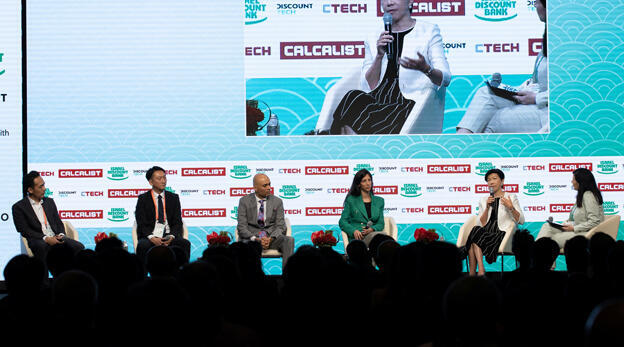
Israel-Japan Conference
"Israeli companies must find a way to cooperate with the local market in Japan"
Kathy Matsui, General Partner, MPower Partners, was speaking on a panel at the Israel-Japan Conference alongside Vivek Mahajan, Corporate Executive Officer SEVP, CTO, CPO, Fujitsu; Hiro Mori, General Manager, Israel Development Office, Toshiba; Keigo Aoki, Executive Director, Dentsu Innovation Initiative, Dentsu Group; and Anat Tila Cherni, Managing Partner, Aristagora VC
The “Navigating the Business Landscape of Japan & Israel” panel at the Israel-Japan Conference
(Shmulik Dudfur)
The underlying theme of the “Navigating the Business Landscape of Japan & Israel” panel at the Israel-Japan Conference in Tokyo on Tuesday was the need for Israeli companies to find a way to integrate into the Japanese market.
The panel was moderated by Calcalist’s Sophie Shulman and included: Kathy Matsui, General Partner, MPower Partners; Vivek Mahajan, Corporate Executive Officer SEVP, CTO, CPO, Fujitsu; Hiro Mori, General Manager, Israel Development Office, Toshiba; Keigo Aoki, Executive Director, Dentsu Innovation Initiative, Dentsu Group; and Anat Tila Cherni, Managing Partner, Aristagora VC.
"I work very hard to find local companies and innovative technologies to integrate into companies here in Japan," said Matsui.
“There are 90 offices of leading Japanese companies in Israel and there is a lot of investment and acquisition activity of Israeli companies by Japanese companies," noted Tila Cherni.
Kathy Matsui, you are a former Vice Chair, Chief Japan Strategist, Partner at Goldman Sachs. How has Japan's industry changed in recent years?
“In the past, there was a poor quality of governance in Japan. No company had an external director, and there was a difficult problem of diversity, and we are working hard on that. Today there are outside directors in every company. In the past there were no votes in the various boards at all, and today there are votes as a natural part of the activity. The field of gender diversity has changed significantly in recent years, and there is an understanding that this is critical to success and innovation. Admittedly, there are still not enough women, but the number of employed women is greater than in almost any western country.”
Tila Cherni: “We are a fund that invests in early stages and is backed only by Japanese investors. Israeli entrepreneurs have changed their way of thinking, and today they are also entering the Asian market. Starting in 2015, mainly thanks to the conflicts between China and the United States, Japan is becoming a major market for Israeli companies in the fields of robotics, climatech, and more.
“The Israeli ecosystem presents a rare opportunity for Japanese investors, and they are beginning to discover it. There is an increase in the number of investments and the amounts invested.”
Vivek Mahajan: You represent Fujitsu and you opened a new office in Israel. What brought you to that decision?
“Fujitsu is already a technological leader and we have chosen to focus on different areas of computing that will advance us. It is not enough for us to be the leading technology company in Japan. We are in a very tough competition with the world, and if you can't present something new and a multinational force you are in trouble.
“We have development centers in Japan, Spain, Silicon Valley and other places in the world so it was important for us to connect with Israel and establish a significant office there. Currently we have a small office with local researchers but this will increase significantly in the near future.”
Hiro Mori, you have been in Israel for quite a few years. What are the most exciting things you have seen there?
“I had over 600 meetings while I was working in Israel, and dozens more proposals for marketing activities in Israel. For example, there is the cyber field, a field that worries us a lot, and which Israel helps us with. We are also looking for partners in the field of climatech. I am optimistic about the collaborations with startup companies.”
Keigo Aoki: “We have a very significant activity in Israel, and we are currently launching activities of Israeli companies all over the world. We have quite a few challenges, and there are quite a few differences between us, but I feel that there is an opportunity here that can help bridge the differences of opinion and culture. We want to connect with fintech companies. There is a feeling that there could be better numbers for trade between Israel and the world.”
















